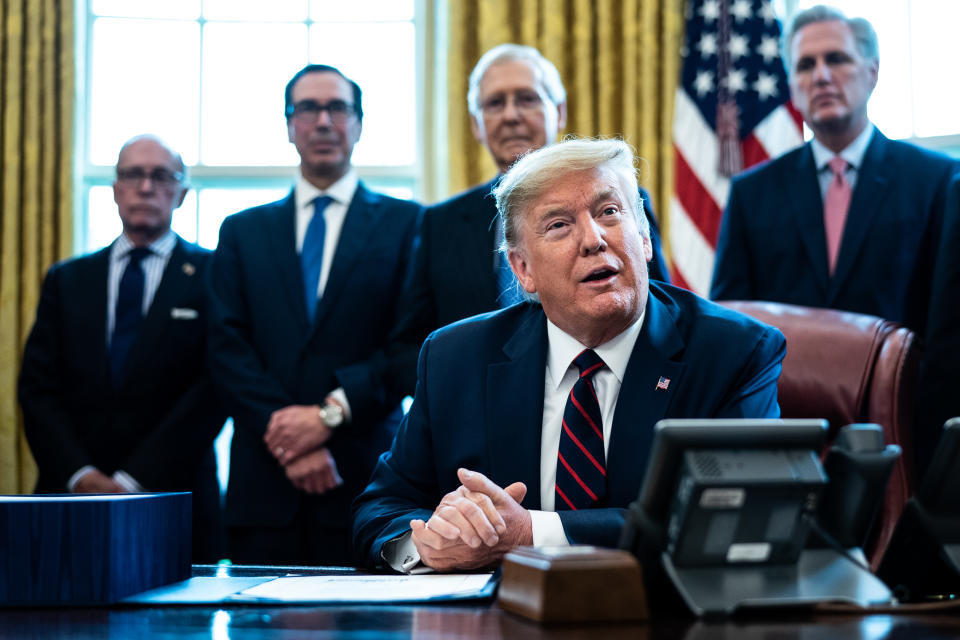Fourth coronavirus stimulus package needs these 3 things: expert
The first, second and third coronavirus stimulus packages provided health care funding, small business loans, unemployment benefits, industry bailouts and $1,200 checks sent directly to consumers. But the work is far from over.
Building infrastructure, bringing supply chains to the U.S., and narrowing inequality are the keys to long-term recovery from the novel coronavirus’ economic impact, said Aron Betru, managing director of the center for financial markets at the Milken Institute.
“This is the perfect time for members of Congress to actually pause and actually think about, how do we build back and build back better to address much larger issues?” said Betru.
Infrastructure is vital for job growth opportunities amongst America’s “longstanding” infrastructure gap, according to Betru. Specifically, the country needs pre-development funds “to identify resilient infrastructure” opportunities. Betru’s support for infrastructure follows President Trump’s proposal of a $2 trillion infrastructure investment in the fourth relief package.
Trump tweeted on March 31:
With interest rates for the United States being at ZERO, this is the time to do our decades long awaited Infrastructure Bill. It should be VERY BIG & BOLD, Two Trillion Dollars, and be focused solely on jobs and rebuilding the once great infrastructure of our Country! Phase 4
— Donald J. Trump (@realDonaldTrump) March 31, 2020
It will also be crucial to offer tax incentives that will loop American businesses into supply chains, so that the U.S. will foster the success of its businesses, said Betru.
“We’re going to see repatriation coming back,” said Betru, adding that the next relief package should encourage programs like the 2018 Tax Cut and Jobs Act’s opportunity zone project, which provides tax incentives for investing in low-income neighborhoods. “I think you’re gonna find pharmaceutical companies, medical device companies taking advantage of those types of provisions, and they should be thinking about repatriating supply chains in a serious way.”
Finally, Betru said, the next stimulus package should address the “longstanding wealth inequality in this country” by fostering minority business development and diverse representation in “the supply chain and the recovery.”

Health is of the utmost importance
Measures to promote minority success could be particularly important for the country’s recovery, especially because inequality could worsen in the new world of working from home or “the quarantine economy,” according to a new study based on Census data, conducted by Apartment List, a San Francisco-based listing website.
Service sector workers are most at risk of layoffs because they are less likely to be deemed essential and do not have the ability to work remotely. High-risk jobs have a median income of $30,000 compared to a $60,000 median salary of jobs deemed “secure.” And 26% of those most at risk live in a cost-burdened household (spends more than 30% of income on rent or mortgage) compared to only 14% employees with secure jobs, the study found.
“Those that are kind of on the bottom of the pyramid in this country, we have to remember prior to this crisis, the average household could not withstand $400 economic shock,” said Betru. “So for those that are at the bottom in particular, the most disadvantaged population, getting them immediate cash is a critical part of it, making sure they have jobs to go back to.”
But despite the need for prudent economic measures, Betru underscored the importance of keeping Americans healthy.
“Whatever we do on the economic front pales in comparison to what we need to do on the health front… However this is not something like that was done in the past where we can do things in sequential order,” he said. “We need to walk and chew gum at the same time, and make sure that we are planning on the economic front.”
Sarah Paynter is a reporter at Yahoo Finance. Follow her on Twitter @sarahapaynter
Read the latest financial and business news from Yahoo Finance
Follow Yahoo Finance on Twitter, Facebook, Instagram, Flipboard, SmartNews, LinkedIn, YouTube, and reddit.
More from Sarah:
Barbara Corcoran: ‘There is no way’ people will buy homes from a virtual tour
Coronavirus pandemic isn’t preventing renters from moving: survey
Closing on a home purchase virtually is more common amid the coronavirus outbreak
